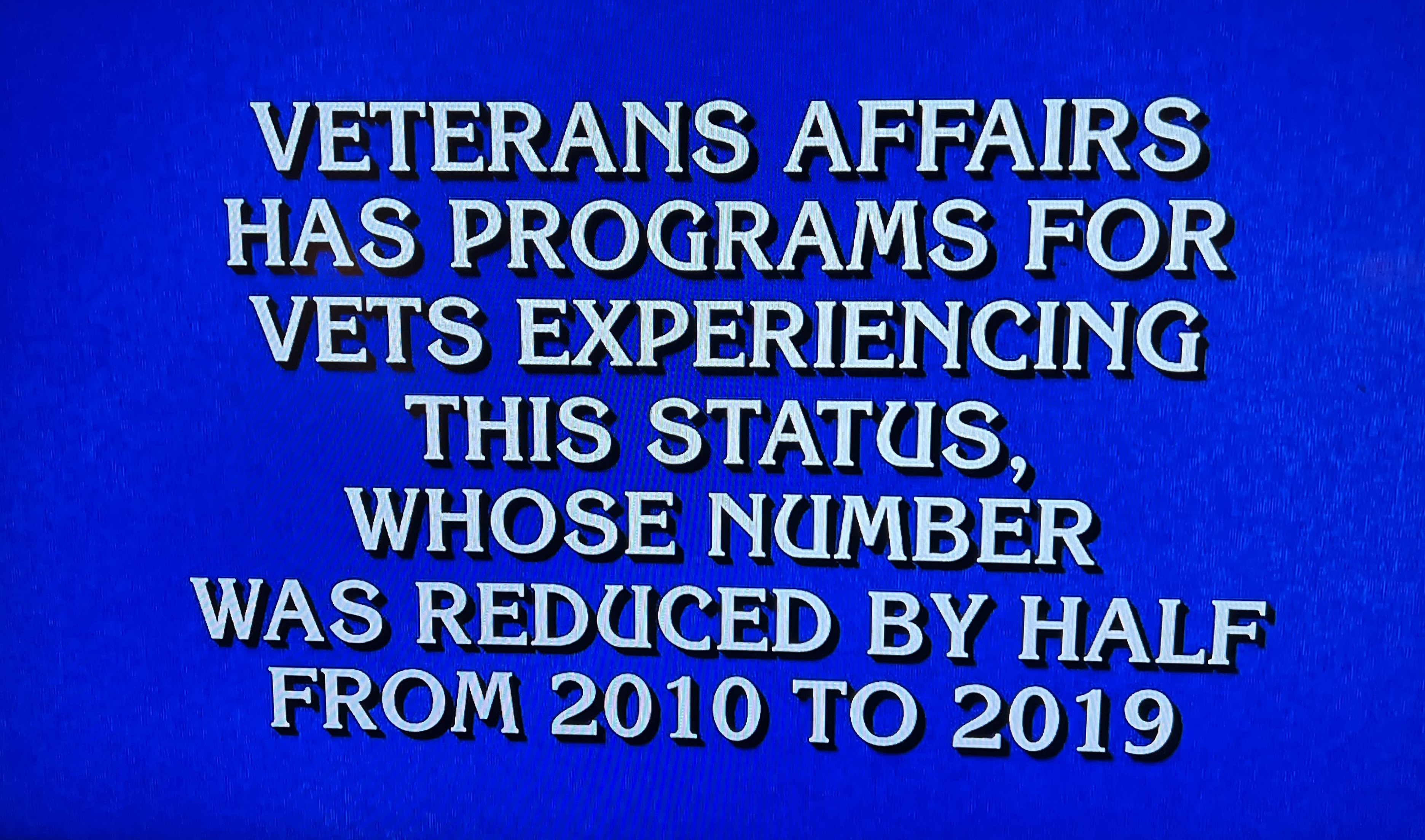Attention A T users. To access the menus on this page please perform the following steps.
1. Please switch auto forms mode to off.
2. Hit enter to expand a main menu option (Health, Benefits, etc).
3. To enter and activate the submenu links, hit the down arrow.
You will now be able to tab or arrow up or down through the submenu options to access/activate the submenu links.
Locator
Contact
Search
VA »
VA Homeless Programs
»
Message from Monica Diaz, Executive Director, VHA Homeless Programs Office
VA Homeless Programs
Message from Monica Diaz, Executive Director, VHA Homeless Programs Office
July 2022

VETERANS AFFAIRS HAS PROGRAMS FOR VETS EXPERIENCING THIS STATUS, WHOSE NUMBER WAS REDUCED BY HALF FROM 2010 TO 2019
If you responded, “What is homelessness?” while tuning into Jeopardy a few weeks ago, you answered the $2,000 question correctly!
I owe the producers of the show a resounding “thank you.” In just a few seconds, Jeopardy informed millions of Americans about VA’s success over the past decade. As I watched the Jeopardy episode, I couldn’t help but think about the similarities between the game and real life.

In the game of Jeopardy, there are multiple categories with answers ranging from commonly known to obscure information. As contestants respond to these prompts, they can either advance with large sums of money and prizes—or lose everything they earned with one wrong move.
In life, we face several categories—health, finances, employment—whose outcomes hinge on our ability to select, or sometimes guess, the “right” answer. Even one hiccup can set us back, effectively erasing any hard work and savings we have created.
VA researchers have identified the categories that are most consequential to Veterans at risk of or experiencing homelessness in their “sector wheel” approach. The wheel is divided into eight slices, or “sectors of a family’s life affected by homelessness.” In interviews with Veterans and their families who experienced homelessness, VA researchers concluded they would need resources and support across each of these categories.
Like Jeopardy, the researchers prove that VA programs must not focus on only one category—we must rather be prepared for the questions and challenges that arise across Veterans’ dynamic lives and situations.
Health Care for Homeless Veterans (HCHV) is just one example of a program that responds to the needs of Veterans expertly. HCHV’s success also rests upon another pillar: outreach. Their staff members reach out to Veterans in their communities with essential items like soap and warm clothing, as well as information about VA programs and benefits. More importantly, they offer a non-judgmental listening ear, their trust, and their support. I encourage you to listen to this month’s episode of Ending Veteran Homelessness featuring Eileen Devine, National Director for HCHV, to learn more about the incredible things this program is accomplishing.
We have seen that outreach can also be an immediate bridge between unsheltered Veterans and positive housing and health outcomes. In 2021, the VA Greater Los Angeles Health Care System began the Care, Treatment, and Rehabilitation Services (CTRS) Initiative, which offers low-barrier entry to high-risk homeless Veterans with health care, case management, peer support, meal services, a clean environment, and transitional housing assistance. At the West LA VA Campus, CTRS has expanded to include 140 tiny shelters for Veterans to live in and receive wraparound services from VA. The West LA VA CTRS model has demonstrated the importance of reaching out to Veterans with the services they need most urgently, while also eliminating any barriers that could stand in the way.
Outreach is needed not only to help Veterans exit homelessness but also to prevent them from entering homelessness. The Veterans Re-entry Search Service (VRSS) is an easy-to-use tool that allows criminal justice organizations to locate Veterans in their populations and enables VA staff to reach out to support Veterans re-entering society. I encourage you to learn more about VRSS, and share this vital tool with organizations you partner with and in your community.
Finally, we can encourage our friends, family, and neighbors to reach out to Veterans experiencing homelessness in their communities. Reaching out to their local VA and homeless service organizations to find out what is most urgently needed is a great first step. As I shared in a recent webcast discussion with VA’s National Emergency Medicine chief, Chad Kessler, MD, simply being aware of the services VA provides is a crucial way to help.
Now, I have just one more question:
ABUNDANT WITH SKILL AND DEDICATION, THIS TEAM IS RESPONSIBLE FOR HELPING VETERANS AVOID AND EXIT HOMELESSNESS EVERY DAY
The response?
“Who is VA Homeless Programs Staff and Partners?”





























